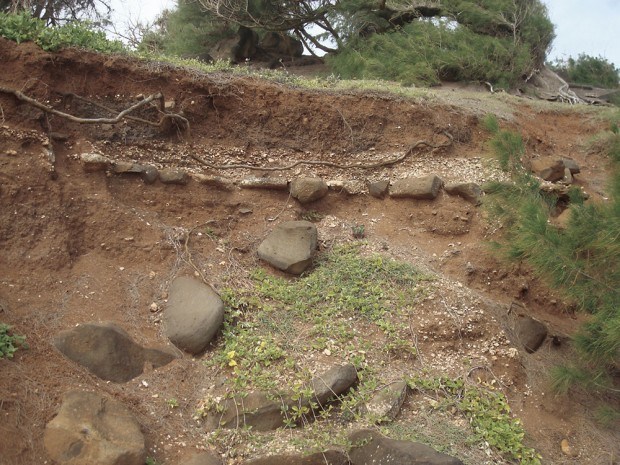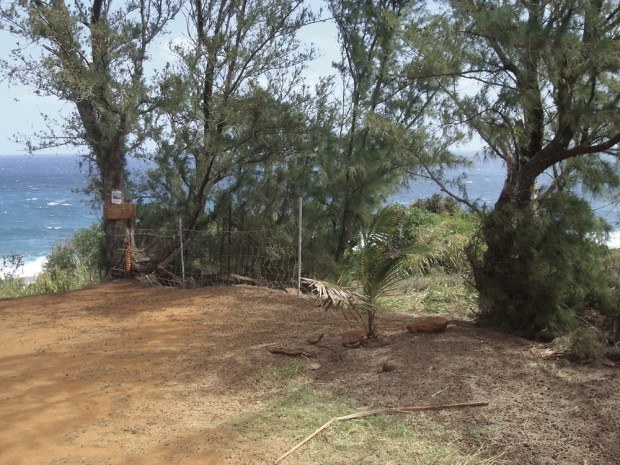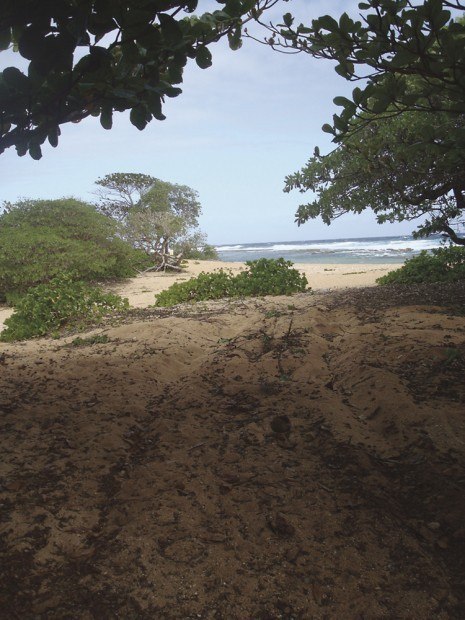LEPEULI — Citing concerns about traditional Hawaiian use and beach access and calling the state’s approval of a controversial proposed cattle fence overlooking Larsen’s Beach “arbitrary, capricious and erroneous,” two appeals were filed earlier this week on behalf of North Shore community members.
“(State Board of Land and Natural Resources) Chairperson (Laura) Thielen failed to fulfill her constitutional obligation to protect Native Hawaiian rights, breached her public-trust obligations, violated her duties under the coastal zone management act, and disregarded the public interest,” Native Hawaiian Legal Corporation attorney David Frankel, who filed an appeal Monday on behalf of longtime Kilauea resident Linda Sproat, said via e-mail Wednesday.
“The emphasis is public access to beaches and preservation of community and Native Hawaiian culture and customary practices. These things are very important to all of us to remember who we are and to remember we’re all part of a community,” attorney Colin Yost, who on Tuesday filed a second appeal on behalf of Surfrider Foundation, Malama Moloa‘a, the Kilauea Neighborhood Association and the Aunty Loke Would Go Coalition, said Thursday.
“Historic trails and public access need to be respected, they can’t simply be erased and cast aside. That cheapens our state as a whole and hurts our entire community,” Yost said.
Sproat said she agreed to attach her name, a weighty one on the North Shore, to the fight because “my people came here in 1200 A.D. in canoes from Tahiti,” landed in Kalalau and moved when it became overpopulated. She said her family has used the alaloa (coastal trail) for fishing for generations.
“They talked about how they used to walk from Anahola to Ka‘aka‘aniu to pick limu. That was just the way we did it in the old days before we had roads and cars,” Sproat said. “People used to walk all the way from Kilauea Point. It’s not as if we don’t know what we’re doing and we haven’t used the place.”
Hope Kallai of Malama Moloa‘a, who along with members of the Sierra Club led The Garden Island on a tour of the area Sunday that included viewings of apparent cultural and archaeological sites, said Larsen’s is “the closest beach to home, and it’s just too precious to lose on my watch. I couldn’t live with myself if I just let it go without a wiggle.”
Landowner responds
A Conservation District Use Application filed by Paradise Ranch for landscaping, fence replacement and brush and pasture management was approved on Feb. 16 by Thielen after a recommendation to approve came from the state Department of Land and Natural Resources Office of Conservation and Coastal Lands.
The recommendation included 18 conditions, including one that states that any approved work “shall not hamper, impede or otherwise limit the exercise of traditional, customary or religious practices in the immediate area,” and another that ensures public access to the beach is not disrupted, provisions that Paradise Ranch’s landlord, the Waioli Corporation, acknowledged Thursday.
“It is not and never has been Waioli Corporation’s or Paradise Ranch’s desire or intent either to prohibit or adversely affect legal access to Larsen’s Beach or the exercise of traditional, cultural or religious Native Hawaiian rights,” Waioli attorney Don Wilson said in an e-mail to reporters. “Waioli supports and has no objection whatsoever to this condition.
“Waioli Corporation has several very legitimate concerns about the use of Larsen’s Beach and the long history of trespassing, vandalism and other illegal activities that have occurred on Waioli’s property,” Wilson said, “and believes that there is a proper and fair balance to be struck between, on the one hand, existing rights to and expectations of beach and gathering access to the property and, on the other hand, Waioli’s private-property rights and the legitimate interests of Waioli and its lessee.
“Nothing done under the permit will disrupt public access to Lepeuli Beach and the effort to resolve and improve legal public access to the beach has already commenced with the county,” Wilson said. “Waioli is committed to following through with this effort to find a satisfactory resolution with the condition of the county-owned beach access trail.”
Beth Tokioka, executive assistant to Mayor Bernard Carvalho, acknowledged Thursday that discussions are ongoing and that the mayor “is interested in having appropriate and safe access for the public to Larsen’s and Waioli has been fully cooperative in the effort to reach that goal.”
The county’s Public Access, Open Space, and Natural Resources Preservation Fund Commission has discussed the possibility of recommending that county officials use real-property-tax incentives or other means to acquire beach-access routes to Ka‘aka‘aniu Beach and other priority locations, and has reportedly scheduled a North Shore “field trip” for next week.
What comes next
Both appeals request the same action — that the full Board of Land and Natural Resources hold a contested-case hearing and decide the matter after additional public input.
Yost said Thursday that Thielen “inappropriately fast-tracked an issue that clearly had robust public concern associated with it,” pointing to “irrefutable facts” like the existence of a coastal path that has been in use “since time immemorial” and calling coastal access a “sacred cow” in Hawai‘i.
“We’re not casting aspersions or saying that the chair acted with malice or bad faith, it just seemed that this didn’t receive the close attention it deserved,” Yost said.
“DLNR is only one agency, the chair only one person. It’s hard to give everything the attention it deserves, but this is a case where the process broke down, it didn’t work, so we’re asking for a better process to happen.”
Section 13-5-22(b) of the Hawai‘i Administrative Rules outlines when a “departmental permit” requiring the approval of only the BLNR chair is required, and when a “board permit” requiring the entire board’s approval is necessary. Landscaping uses generally only require the chair’s signature.
“(Thielen’s) decision will harm coastal resources and reduce public access. It was made without the benefit of a site visit, without a hearing on Kaua‘i, without reviewing the voluminous evidence that had been submitted to her, and in reliance on misleading claims by the applicant,” Frankel said.
Attempts to reach Thielen for comment via e-mail, her office phone and cell phone were unsuccessful this week.




